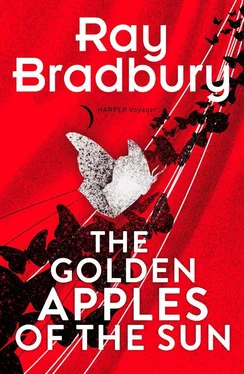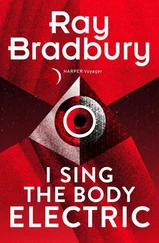1 ...7 8 9 11 12 13 ...18 From the comers of his eyes he saw the little webs. When his back was turned the little spiders came out of the woodwork and delicately spun their fragile little half-invisible webs. Not upon the wall at his left, which was already washed fresh, but upon the three walls as yet untouched. Each time he stared directly at them the spiders dropped back into the woodwork, only to spindle out as he retreated. “Those walls are all right,” he insisted in a half shout. “I won’t touch them!”
He went to a writing desk at which Huxley had been seated earlier. He opened a drawer and took out what he was looking for. A little magnifying glass Huxley sometimes used for reading. He took the magnifier and approached the wall uneasily.
Fingerprints.
“But those aren’t mine!” He laughed unsteadily. “I didn’t put them there! I’m sure I didn’t! A servant, a butler, or a maid perhaps!”
The wall was full of them.
“Look at this one here,” he said. “Long and tapered, a woman’s, I’d bet money on it.”
“Would you?”
“I would!”
“Are you certain?”
“Yes!”
“Positive?”
“Well—yes.”
“Absolutely?”
“Yes, damn it, yes!”
“Wipe it out, anyway, why don’t you?”
“There, by God!”
“Out damned spot, eh, Acton?”
“And this one, over here,” scoffed Acton. “That’s the print of a fat man.”
“Are you sure?”
“Don’t start that again!” he snapped, and rubbed it out. He pulled off a glove and held his hand up, trembling, in the glary light.
“Look at it, you idiot! See how the whorls go? See?”
“That proves nothing!”
“Oh, all right!” Raging, he swept the wall up and down, back and forth, with gloved hands, sweating, grunting, swearing, bending, rising, and getting redder of face.
He took off his coat, put it on a chair.
“Two o’clock,” he said, finishing the wall, glaring at the clock.
He walked over to the bowl and took out the wax fruit and polished the ones at the bottom and put them back, and polished the picture frame.
He gazed up at the chandelier.
His fingers twitched at his sides.
His mouth slipped open and the tongue moved along his lips and he looked at the chandelier and looked away and looked back at the chandelier and looked at Huxley’s body and then at the crystal chandelier with its long pearls of rainbow glass.
He got a chair and brought it over under the chandelier and put one foot up on it and took it down and threw the chair, violently, laughing, into a corner. Then he ran out of the room, leaving one wall as yet unwashed.
In the dining room he came to a table.
“I want to show you my Gregorian cutlery, Acton,” Huxley had said. Oh, that casual, that hypnotic voice!
“I haven’t time,” Acton said. “I’ve got to see Lily——”
“Nonsense, look at this silver, this exquisite craftsmanship.”
Acton paused over the table where the boxes of cutlery were laid out, hearing once more Huxley’s voice, remembering all the touchings and gesturings.
Now Acton wiped the forks and spoons and took down all the plaques and special ceramic dishes from the wall itself....
“Here’s a lovely bit of ceramics by Gertrude and Otto Natzler, Acton. Are you familiar with their work?”
“It is lovely.”
“Pick it up. Turn it over. See the fine thinness of the bowl, hand-thrown on a turntable, thin as eggshell, incredible. And the amazing volcanic glaze. Handle it, go ahead. I don’t mind.”
HANDLE IT. GO AHEAD. PICK IT UP!
Acton sobbed unevenly. He hurled the pottery against the wall. It shattered and spread, flaking wildly, upon the floor.
An instant later he was on his knees. Every piece, every shard of it, must be found. Fool, fool, fool! he cried to himself, shaking his head and shutting and opening his eyes and bending under the table. Find every piece, idiot, not one fragment of it must be left behind. Fool, fool! He gathered them. Are they all here? He looked at them on the table before him. He looked under the table again and under the chairs and the service bureaus, and found one more piece by match light and started to polish each little fragment as if it were a precious stone. He laid them all out neatly upon the shining polished table.
“A lovely bit of ceramics, Acton. Go ahead—handle it.”
He took out the linen and wiped it and wiped the chairs and tables and doorknobs and windowpanes and ledges and drapes and wiped the floor and found the kitchen, panting, breathing violently, and took off his vest and adjusted his gloves and wiped the glittering chromium.... “I want to show you my house, Acton,” said Huxley. “Come along.... ” And he wiped all the utensils and the silver faucets and the mixing bowls, for now he had forgotten what he had touched and what he had not. Huxley and he had lingered here, in the kitchen, Huxley prideful of its array, covering his nervousness at the presence of a potential killer, perhaps wanting to be near the knives if they were needed. They had idled, touched this, that, something else—there was no remembering what or how much or how many—and he finished the kitchen and came through the hall into the room where Huxley lay.
He cried out.
He had forgotten to wash the fourth wall of the room! And while he was gone the little spiders had popped from the fourth unwashed wall and swarmed over the already clean walls, dirtying them again! On the ceilings, from the chandelier, in the corners, on the floor, a million little whorled webs hung billowing at his scream! Tiny, tiny little webs, no bigger than, ironically, your—finger!
As he watched, the webs were woven over the picture frame, the fruit bowl, the body, the floor. Prints wielded the paper knife, pulled out drawers, touched the table top, touched, touched, touched everything everywhere.
He polished the floor wildly, wildly. He rolled the body over and cried on it while he washed it, and got up and walked over and polished the fruit at the bottom of the bowl. Then he put a chair under the chandelier and got up and polished each little hanging fire of it, shaking it like a crystal tambourine until it tilted bellwise in the air. Then he leaped off the chair and gripped the doorknobs and got up on other chairs and swabbed the walls higher and higher and ran to the kitchen and got a broom and wiped the webs down from the ceiling and polished the bottom fruit of the bowl and washed the body and doorknobs and silverware and found the hall banister and followed the banister upstairs.
Three o’clock! Everywhere, with a fierce, mechanical intensity, clocks ticked! There were twelve rooms downstairs and eight above. He figured the yards and yards of space and time needed. One hundred chairs, six sofas, twenty-seven tables, six radios. And under and on top and behind. He yanked furniture out away from walls and, sobbing, wiped them clean of years-old dust, and staggered and followed the banister up, up the stairs, handling, erasing, rubbing, polishing, because if he left one little print it would reproduce and make a million more!— and the job would have to be done all over again and now it was four o’clock!—and his arms ached and his eyes were swollen and staring and he moved sluggishly about, on strange legs, his head down, his arms moving, swabbing and rubbing, bedroom by bedroom, closet by closet....
They found him at six-thirty that morning.
In the attic.
The entire house was polished to a brilliance. Vases shone like glass stars. Chairs were burnished. Bronzes, brasses, and coppers were all aglint. Floors sparkled. Banisters gleamed.
Everything glittered. Everything shone, everything was bright!
They found him in the attic, polishing the old trunks and the old frames and the old chairs and the old carriages and toys and music boxes and vases and cutlery and rocking horses and dusty Civil War coins. He was half through the attic when the police officer walked up behind him with a gun.
Читать дальше








